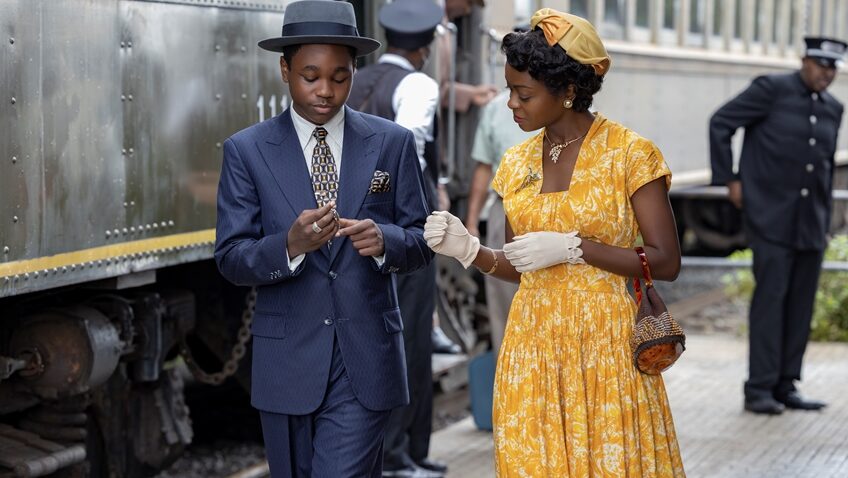Joyce Glasser reviews TILL (January 13, 2023) Cert 12A, 130 mins.
Bob Dylan’s song, The Death of Emmett Till isn’t vintage Dylan, but when he read about the injustice “… down in Mississippi not so long ago” he had to write it. Decades later, Nigerian-American co-writer, director Chinonye Chuke had a similar reaction and had to make this powerful film.
Chuke’s debut feature, Clemency, about the execution of a black man whose conviction was unsafe, agreed with Dylan that: “If you can’t speak out against this kind of thing, /A crime that’s so unjust/Your eyes are filled with dead man’s dirt and your/mind is filled with dust.” More importantly, they both agreed with Emmett’s mother, Mamie Till Mobley (a brilliant performance from Danielle Deadwyler) who, from the verdict in 1955 until her death in 2003, never stopped speaking out.
Emmett, a well-dressed, fun-loving prankster with a twinkle in his eye, is excited about spending some of his summer holiday with his cousins in Money, Mississippi where his mother was born. He has never been to the South before and the 14-year-old is feeling grown up because he is taking the train by himself.

Mamie, full of anxiety and fear, warns Emmett that in the South they have a different set of rules for Negroes: ‘You can’t look at them the wrong way.’ Her warnings are numerous, and her guidance is so insistent that even if you do not know the story, and many viewers won’t, you would know Mamie’s worst fears will come to pass.
Mamie, a war widow (Louis Till was an abusive husband) wants Emmett to stay. Her mother (a first-class performance from Whoopi Goldberg) tells her, ‘you got to let that boy live his life.’ The irony of those words contributes to the heavy foreshadowing.
As it happens, his life was lived for another week. Emmett’s two week holiday was cut short when he went into a general store run by Carolyn (Haley Bennett) and Roy (Sean Michael Weber) Bryant. Roy was away and Carolyn was alone in the store. No one but Carolyn (who is apparently still alive and close to 90) knows what transpired in the few minutes when Emmett went into the store to buy some sweets. His cousins remained outside. Apparently his crime was to pay Carolyn a compliment and whistling as he left. His cousins quickly drive him away.
Three days after the incident, Bryant and his half-brother, JW Milam (Eric Whitten) show up in the middle of the night at the home of Moses Wright (John Douglas Thompson), Emmett’s great uncle. Moses begs them to let the boy off with a whipping, but the men break into the house and leave with Emmett. They take him to a barn where the audience is spared the gruesome experience of the barbarous torture that ensued before the corpse –pistol-whipped, beaten, mutilated, shot and lynched – was thrown off the Black Bayou Bridge into the Tallahatchie River, weighed down by a large fan blade attached to his neck by barbed wire.

There is a tense wait after Mamie receives the news that Emmett is missing. Early on the National Association for the Advancement of Colored People (NAACP) get involved with Medgar Evers, Mississippi state field secretary for the NAACP searching for the body and witnesses. Evers was assassinated eight years later.
Despite the weight, two boys fishing find a body in the river. At this point Mamie changes from a worried and then grieving mother to a pillar of contained rage. She could not protect her son, but his death will not be in vain.
Mamie is surrounded by men – most well-meaning, many less so – who want to tell her what to do. The first decision she makes is that Emmett’s body will not, as the governor wanted, receive a quick burial in Mississippi. She has to fight to get it back. The corpse will be left as found and shipped to Chicago. No undertaker is allowed to attempt – even if it were possible – to make the corpse presentable.
Mamie makes the courageous decision to have an open casquet funeral. The public will be invited. It will be photographed; it will be televised, and it will be written about. Chuke uses the camera to recreate for the audience the impact on the world of seeing the body. But first, in a film that is all about seeing and not seeing, we witness a mother clearing the mortuary, to be alone with her son. As she turns to study the disfigured body and swollen face with a once bright eye missing, her tears dry. Deadwyler’s face turns from grief, to anger, and to gritty resolve in a single shot.
The trial in the hostile environment of Sumner, Mississippi, where there are no hotels for Blacks, is another nightmare. Although the court refuses to allow Mamie to testify before a jury as she was not present, she is grilled by the prosecution who try to discredit her. Amongst other tactics and statements that will make your blood boil, the defence try to establish that the corpse is not recognisable. Mamie gives a detailed and touching account of how a mother can always recognise her son.
On a practical note, the murderers had left the ring belonging to Emmett’s father on his finger. That was irrefutable evidence. Still, the trial is hard to listen to. The threatened witnesses, the lies, the prejudice and the stacked jury make a mockery of justice. But Mamie is prepared for the not guilty verdict that quickly arrives.
Her mind is already elsewhere. And the world is watching. Three months after Emmett’s burial in Illinois, in Montgomery, Alabama Rosa Parks refuses to give up her seat for a white man. Two years after the trial Congress passes the Civil Rights Act of 1957. Now the U.S. Department of Justice could intervene in local law enforcement issues when individual civil rights were being compromised. Markers have been erected all over the area where Emmett was murdered and Carolyn Bryant, who divorced Roy, lived to see them. Last year, Joe Biden signed into law the Emmett Till Antilynching Act.
Bob Dylan was born one month before Emmett Till in 1941. He knows why he is still alive, and Emmett is not: “The reason that they killed him there and I’m sure it ain’t no lie/’Cause he was born a black-skinned boy, he was born to die.”




